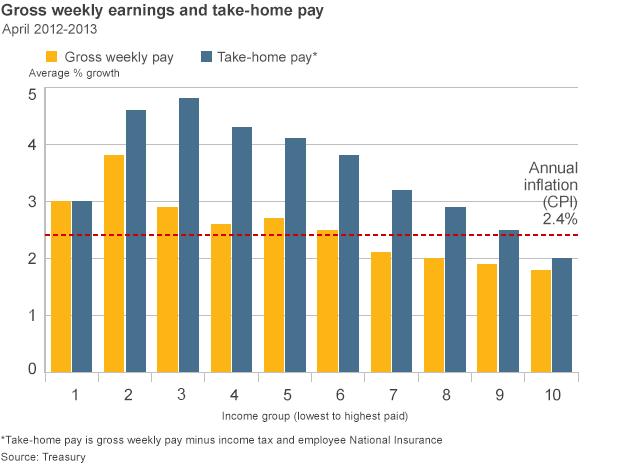UK pay rising in real terms, says coalition
- Published
- comments
David Cameron: "I want to see people paid more"
Most British workers have seen their take-home pay rise in real terms in the past year, the government claims.
It has produced figures showing all except the richest 10% saw their take-home wages rise by at least 2.5% once tax cuts were taken into account.
That is more than the Consumer Prices Index (CPI) inflation rate of 2.4% in the year to April 2013.
Labour leader Ed Miliband said the figures were "dodgy" and ministers were out of touch with people's lives.
The government said the figures showed only the top 10% of earners fell behind the CPI rate - which excludes the costs of buying and owning a home such as mortgage interest repayments - with an average increase of 2%.
It said it made its claims by taking into account cuts to income tax and national insurance.
Conservative skills and enterprise minister Matthew Hancock said: "Of course, as a consequence of the great recession, people who work hard have been made poorer and times are tough for families as a result.
"That's why, as part of our long-term economic plan, we are cutting taxes for hardworking people so they have more money in their pockets and are more financially secure."
Speaking on Thursday, Prime Minister David Cameron said there were "some positive signs" on take-home pay but a sustained and broad-based recovery in people's finances would take time.
The Lib Dems said they had been the driving force behind tax cuts for the lowest-paid, which will see no-one pay tax on the first £10,000 of their income by 2015.
But Labour said the government's figures were based on weekly, not annual earnings and did not take account of benefits cuts.

"This is a complete insult to millions of people who can see with own eyes and feel with own pay packets that they are getting worse off," Mr Miliband said.
"I think this is a government in a hole that has no answers to cost of living crisis."
"All they're producing is a set of dodgy statistics, data that doesn't add up, to try and tell people what they can see with their own experiences, with their own lives just isn't true."
Paul Johnson, director of the Institute for Fiscal Studies, told BBC Radio 4's Today programme the government had used "a perfectly sensible set of numbers" to calculate take-home pay for the 2012-2013 period.
But he pointed out that more up-to-date Office for National Statistics data - the average weekly earnings index, external - showed wages rose "quite a lot less quickly than inflation in the most recent months".
He added that the IFS's own analysis suggested that "if the recovery takes off and continues as expected, people will start to see their incomes rising by 2015... but they will be well below where they were six or seven years ago".
Labour's assertion that real annual wages have fallen by £1,600, on average, since 2010 also only gave a "partial picture", the IFS added.
TUC General Secretary Frances O'Grady said the government's figures should be taken "with several tons of salt" as they did not include the effects of tax credits and benefits, particularly the freeze in child benefits.
Earlier this week, the International Monetary Fund upgraded its forecast for the UK economy, the latest in a series of positive economic indicators.
It now expects the economy to grow 2.4% this year - faster than any other major European economy - against its previous forecast of 1.9%.

- Published24 January 2014
- Published24 January 2014
- Published24 January 2014
- Published14 January 2014